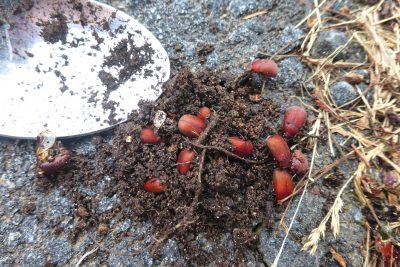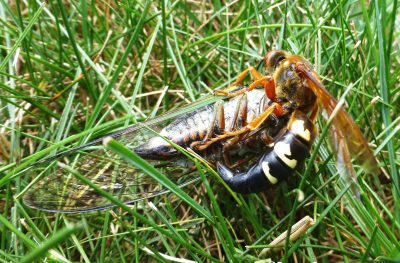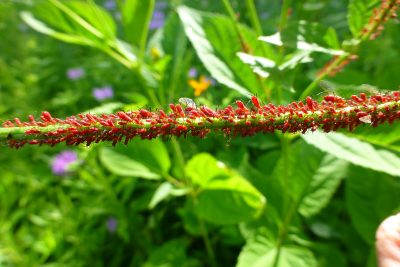By Pamm Cooper, UConn Home & Garden Education Center
Here at the UConn Home & Garden Education Center we have been getting questions about three pests that have been particularly widespread in the state. Whether in the landscape or the garden, there is always something going on, good or bad, and keeping up with pests or perceived pests can be challenging. The following reflect the most common inquiries we have had over the past few weeks.

Asiatic garden beetles have been a real problem for many gardeners this year. An imported pest, these small, rusty brown, night-feeding pests can devastate plants overnight then disappear during the day. Leaving you to wonder what is eating your plants. Favorite plants include dahlias, basil, zinnias, sunflowers, peppers, eggplants and goldenrods. They will feed on over 100 herbaceous and woody plants. In the evening a plant can look great, and the next day it can be a skeleton of stems and leaf veins.
Check damaged plants at night with a flashlight; if they are active, you should find them. During the day, dig an inch or so into the mulch and soil under damaged plants. These beetles will hide there during the day. Some people have reported finding as many as 300 in a night, then 50 each night, until they find few or none. New beetles will fly in daily, so be vigilant. Feeding by adults should end by the end of August. Crush them or put them in a container of soapy water until they succumb. Foliage can also be treated with an appropriate insect control product that will kill them after they feed on the leaves, Read and follow label instructions carefully for any control products if they are needed.

Cicada killers are rather mild-mannered (like Clark Kent) burrowing wasps that can cause alarm when they appear in the summer months. These wasps are very large, and females have the potential to sting, but have no aggressive nest-guarding instincts as do most other wasps or bees. What they have is size, and so become easily feared, especially when they burrow along sidewalks or other sandy areas close to pool, gardens and houses.
Female cicada killers burrow a rather rectangular tunnel deep into soft soils into which they will eventually drag a cicada they have paralyzed. They lay one egg on the victim and the larva will feed on the carcass and pupate over the winter. They may be a chronic problem in areas of sandy soils and can be discouraged by disrupting tunneling activity by drenching areas where they are actively tunneling with water. They do not like moist soils, so this may be the only control method needed. Digging may disrupt root systems of plants if the tunnels are made at the base of plants, and watering the plants affected in this way may settle the soil back around the roots. Use of any pesticide would only be effective if wasps are still going in and out of tunnels and should be used only if necessary.
The final pest we will cover are aphids. These piercing-sucking feeding type insects are small, but they can occur, seemingly overnight, in large numbers on plants. Aphids prefer newer growth like upper stems but are not so fussy later in the year when they feed on flower buds, old and new leaves and flower stems. Later in the summer some species may cover older stems right down to the ground. This is especially a problem on common and swamp milkweeds. Aphid feeding can cause wilting of plant parts above where heavy feeding occurs. Leaves can be mottled, then become distorted before turning brown.

Control of aphids relies on paying attention every day. Aphid females can give birth to live young during the summer, often fifty or more new aphids appear from each female per day. This is why control seems effective, then before you can say “my plants look really good now”, there are scads of aphids back where they were before. Aphids in high numbers, especially on sturdy stems, can be crushed by hand, sprayed with a suffocating type product like insecticidal soap, or knocked off by a strong jet of water. Keep in mind that the reproductive females have wings, and they will take flight at the first sign of trouble. That is why they can persist on plants.
If aphids are a serious issue on plants, with no control measures apparently working, consider removing the affected plants and adding plants you know they so far have shunned as a food source. It may be a painful but necessary step.
Be alert to what is happening in your own backyard, for it is certain something, good or bad, is going on. The sooner you discover the bad, the better. Know that: “On every stem, on every leaf, and at the root of everything that grew, was a professional specialist in the shape of grub, caterpillar, aphis, or other expert, whose business it was to devour that particular part. “~Oliver Wendell Holmes
For questions about garden pests or any other gardening questions, feel free to contact us, toll-free, at the UConn Home & Garden Education Center at (877) 486-6271, visit our website at www.homegarden.cahnr.uconn.edu